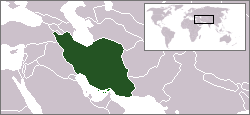Iran to end nuclear cooperation
Saturday, January 14, 2006

Iranian president Mahmoud Ahmadinejad spoke out in a rare news conference on Saturday against statements made by Europe and the United States, saying that if any country refers it to the U.N. Security Council over its nuclear program, that it will end their voluntary compliance with surprise inspections and other nuclear cooperation with the U.N. nuclear watchdog, the IAEA. He also warned that Europe will lose the chance of reconciliation if it pursues sanctions.
President Ahmadinejad said that even if Iran is referred to the Security Council for possible sanctions, the action would still not stop its nuclear program. "They keep on threatening us that we have to either accept what they say or they will send us to the Security Council," President Mahmoud Ahmadinejad said during a news conference in the Iranian capital of Tehran.
Iran's statements came as Europe and the U.S. began to build support for reporting Iran to the U.N. Security Council. However, China has been cautious and has warned the move could only escalate the confrontation.
Meanwhile, President George W. Bush, and Chancellor Angela Merkel, urged U.N. intervention. "The world needs to send a common message to Iran that their behavior...is unacceptable," Bush said.
The U.S. and Europe continue to have growing concerns that Iran is trying to produce nuclear weapons.
On Tuesday, Britain, France and Germany issued a statement declaring that 2 1/2 years of tense negotiations with Tehran were a "dead end" and urged the U.N. Security Council to intervene.

Iranian Foreign Minister, Manoucher Mouttaki, said to the press yesterday that "the West will bear the consequences if Iran is sent to the Council. Iran does not need to have permission from any country. It is our legal right to have nuclear energy."
In response the Bush administration, along with Chancellor Angela Merkel, said that they "cannot allow countries such as Iran to blackmail peace-loving countries like themselves."
Iranian President Mahmoud Ahmadinejad said that his "country does not need nuclear weapons. They are needed only by people who want to solve everything through the use of force." He then went on to say, "Leaders who believe they can create peace for themselves by creating war for others are mistaken."
Tehran has always said it has the right under Article VI of the nuclear Non-Proliferation Treaty — which the nation has signed but not ratified — to research nuclear energy for peaceful purposes.
Related news
- "Iran nuclear talks have stalled" — Wikinews, January 13, 2006
- "Iran resumes nuclear research" — Wikinews, January 10, 2006
- "Iran, North Korea, USA blamed in failure of month-long Non-Proliferation Treaty conference" — Wikinews, June 2, 2005
Sources
- Nazila Fathi. "U.N. Scrutiny Won't Make Iran Quit Nuclear Effort, President Says" — The New York Times, January 14, 2006
- "Iran Challenges Europe in Nuclear Crisis" — ZAMAN Daily Newspaper, January 14, 2006
- Ali Akbar Dareini. "Iran Threatens to End Nuclear Cooperation" — ABC News, January 14, 2006
- "Iran 'does not need nuclear arms'" — BBC News Online, January 14, 2006
- "Iran "does not need nuclear arms"- Ahmadinejad" — Aljazeera, January 14, 2006